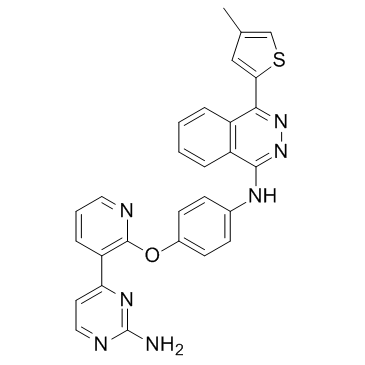945595-80-2
| Name | N-[4-[3-(2-aminopyrimidin-4-yl)pyridin-2-yl]oxyphenyl]-4-(4-methylthiophen-2-yl)phthalazin-1-amine |
|---|---|
| Synonyms |
N-(4-(3-(2-aminopyrimidin-4-yl)pyridin-2-yloxy)phenyl)-4-(4-methylthiophen-2-yl)phthalazin-1-amine
AMG 900 N-(4-{[3-(2-Amino-4-pyrimidinyl)-2-pyridinyl]oxy}phenyl)-4-(4-methyl-2-thienyl)-1-phthalazinamine CS-0485 cc-2 AMG900 |
| Description | AMG 900 is a potent and highly selective pan-Aurora kinases inhibitor with IC50 of 5 nM, 4 nM and 1 nM for Aurora A, B and C, respectively. |
|---|---|
| Related Catalog | |
| Target |
Aurora A:5 nM (IC50) Aurora B:4 nM (IC50) Aurora C:1 nM (IC50) |
| In Vitro | AMG 900 inhibits the enzyme activity of all 3 aurora kinase family members with IC50 values of 5 nM or less. In HeLa cells, AMG 900 inhibits autophosphorylation of aurora-A and -B in a concentration-dependent manner. Treatment of HCT116 cells with 50 nM of AMG 900 for 48 hours resulted in polyploidy and suppresses the formation of colonies after cell replating. AMG 900 inhibits cell proliferation, with EC50 values ranging from 0.7 to 5.3 nM. Importantly, 4 of these AMG 900-sensitive cell lines (HCT-15, MES-SA-Dx5, 769P, and SNU449) are resistant to paclitaxel and other anticancer agents. AMG 900 inhibits p-histone H3 or induced polyploidy across all the cell lines tested irrespective of P-gp or BCRP status with uniform potency (IC50 or EC50 values ranging from 2 to 3 nM)[1]. |
| In Vivo | AMG 900 exhibits significant antitumor activity in all 9 xenograft models tested (50%-97% TGI compared with the vehicle-treated control group, P<0.005, P<0.0005). Importantly, AMG 900 is active in the MES-SA-Dx5 (84% TGI, P<0.0001) and NCI-H460-PTX (66% TGI, P<0.0001) xenograft models that are resistant to either Docetaxel or Paclitaxel administered at their respective maximum tolerated doses. AMG 900 inhibits the activity of aurora-B in HCT116 tumors and suppresses the growth of multiple xenografts that represent diverse tumor types[1]. Treatment with AMG 900 at 15 mg/kg significantly inhibits p-Histone H3 in the G2M cell population in mouse bone marrow (upper panel) and cytokeratin positive COLO 205 tumor (lower panel) compared with vehicle-treated controls[2]. AMG 900 exhibits a low-to-moderate clearance and a small volume of distribution. Its terminal elimination half-life ranged from 0.6 to 2.4 h. AMG 900 is well-absorbed in fasted animals with an oral bioavailability of 31% to 107%. Food intake had an effect on rate (rats) or extent (dogs) of AMG 900 oral absorption[3]. |
| Cell Assay | Different tumor cell lines including NCI-H460, MDA-MB231, MES-SA, NCI-H460 PTX, MDA-MB-231 PTX, MES-SA Dx5, and HCT-15. are treated with AMG 900 (0.5, 5.0, 50 nM) for 48 hours, washed twice with complete media, and cells are replated at a density of 5000 cells per well in drug-free complete media. Cells are grown until the DMSO control wells are confluent. Cells are stained with crystal violet dye, washed with distilled water, and imaged using a digital scanner[1]. |
| Animal Admin | Mice[2] Female athymic nude mice of approximately 14 weeks of age are used. Mice are injected subcutaneously with 2×106 COLO 205 cells in 100 μL of 50% matrigel. Mice with established tumors (approximately 200 mm3) are assigned into experimental groups (n=10 per group) and administered a single oral dose of vehicle or AMG 900 at 3.75, 7.5, and 15 mg/kg. Three hours after treatment tissue specimens (bone marrow, tumor, and skin) are collected from individual mice for pharmacodynamic and histological analysis. Blood plasma samples (50 μL) are collected from individual mice to determine the concentration of AMG 900 using quantitative methods. Excised tumors are divided in half for parallel flow and imaging based cytometric analyses. Rats[3] Effect of food intake on AMG 900 PK is evaluated in male rats and male dogs following a single oral dose of AMG 900 at 5 mg/kg (rats) or 2 mg/kg (dogs) in the oral formulation mentioned above. For the rats, food is removed ~16 h before dosing for the fasted group, although the fed group had free access to standard laboratory rodent chow throughout the study; food is returned to rats in the fasted group 2 h post-dose. All the dogs are fasted for ~16 h before dosing. Each dog in the fed group receive 350 g of moist food 1 h prior to dosing, and any remaining food is removed after 1 h. All the dogs are fed 2 h post-dose. |
| References |
| Density | 1.4±0.1 g/cm3 |
|---|---|
| Boiling Point | 778.7±70.0 °C at 760 mmHg |
| Molecular Formula | C28H21N7OS |
| Molecular Weight | 503.578 |
| Flash Point | 424.7±35.7 °C |
| Exact Mass | 503.152832 |
| PSA | 140.70000 |
| LogP | 4.64 |
| Vapour Pressure | 0.0±2.7 mmHg at 25°C |
| Index of Refraction | 1.739 |
| Storage condition | -20℃ |
